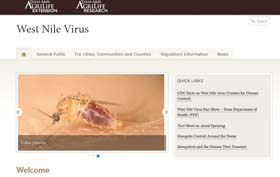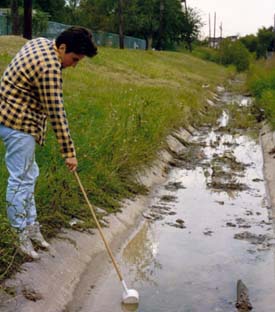STEPHENVILLE, Texas – The summer months usually bring barbecues and swimming pools, and the start of mosquito season.
To help keep residents safe and informed, entomologists at the Texas A&M AgriLife Extension Service recently launched a special website portal called texaswestnile.tamu.edu for
information on West Nile Virus, mosquitoes and mosquito prevention.
The idea to start the site came about after receiving many calls on requests for information during the 2012 mosquito season due to the record number of cases of West Nile . Assistant Professor and Extension Entomologist Dr. Sonja Swiger said the site was started to provide residents with a single, organized location on the Internet for West Nile virus and mosquito information.
Swiger said the site is primarily targeted towards residents of Texas but can be used to help residents in other states dealing with West Nile virus as well.
“The website is intended for all residents of Texas and the US, including people working in the industry of mosquito control, health services and just regular people looking to find information on WNV without having to search several websites,” she said.
Some of the information contained in the site includes links to the Centers for Disease Control and Prevention, Texas Department of State Health Services fact sheets, and current data on WNV. There are also links to Extension publications, blogs and links on mosquitoes so that people can learn about mosquito species, breeding, protecting themselves from bites and how to control for mosquitoes.
Swiger said that the vector carrying mosquito responsible for West Nile Virus in Texas is the southern house mosquito, Culex quinquefasciatus. The mosquitoes breed mostly in stagnant water, usually associated with urban areas.
“The best precautions are to check your yard for standing water,” Swiger said. “This can be cans, jars, buckets, gutters, bird baths, kiddie pools, boat tarps and even tires. All standing water should be dumped if possible or treated with larvicides to kill mosquito larvae.”
In addition to checking the yard, Swiger said that protection is key during mosquito season.
“People need to protect themselves when outside with long sleeves and pants and mosquito repellents,” she said. “Prevention should start when spring arrives (which means now) and until winter. Mosquitoes start developing when temperatures increase in the spring and the rains arrive and they will continue to develop (multiple generations and species) until winter arrives.”
Swiger is hoping that the site will help give residents a single place to find information on the virus and how to prevent the virus-carrying mosquitoes from invading their homes and businesses.
“I hope that the website will provide a single location for interested individuals looking for information on mosquitoes and WNV. Plus they will get up-to-date factual information that is science endorsed, along with access to the state health department that has current WNV numbers,” she said.
Visitors can access the site at http://texaswestnile.tamu.edu

